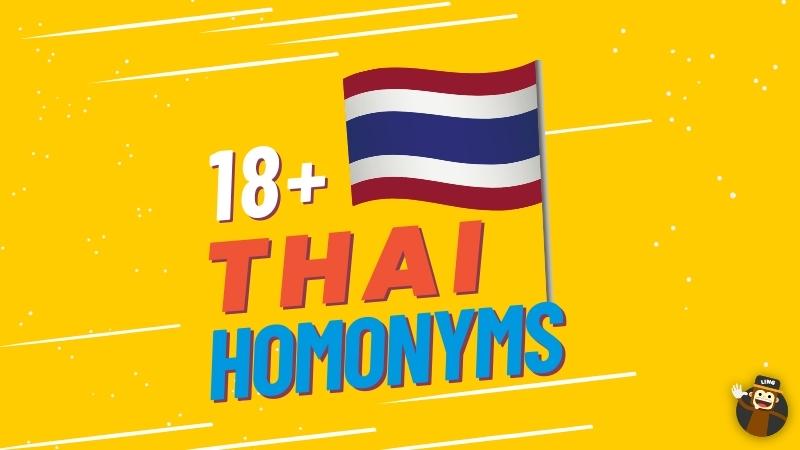When learning Thai, how often do you feel confident in a word you learned from a local, only to find out it meant something entirely different? If this has happened to you often enough that studying Thai seems like a hopeless struggle, take a deep breath; you may simply need to brush up on your knowledge of Thai homonyms.
Many languages have homonyms, and it’s up to the language learners to memorize them and use context clues to determine the correct word. Some examples of English homophones include the words to and two, or another one is sight and site. When learning Thai, it’s a good idea to practice Thai spelling words and Thai grammar to get a sense of how fantastical some Thai words can seem. There’re lots of words that sound the same yet have various spellings and meanings. If you take the time to study Thai homonyms now, you can end your problem tomorrow.
What Are Thai Homonyms?
Homonyms present a unique linguistic obstacle for Thai learners, in addition to the Thai vowel sounds. Similar to English, Thai has homophones and homographs. Homophones are lexical items that share the same pronunciation but are spelled and interpreted differently. However, homographs are words that seem alike in writing but are pronounced differently and have different meanings. Yet, homographs can also have the same or similar spelling but different pronunciations. Let’s take a case-by-case look at this before we make things more confusing for you.
Thai Homophones
รถ/รด/รส (Rót)
| Thai Word | Pronunciation | English Definition |
| รถ | rót | Vehicle |
| รด | rót | Pour (water) |
| รส | rót | Flavor or taste |
ผึ้ง/พึ่ง (Pʉ̂ng)
In Thai culture, people like playing this joke on others and find it amusing to throw off the person’s trying to determine the specific time at which they were stung by a bee. Because instead of เพิ่ง (pə̂əng), which means just now; Thais often pronounce it as พึ่ง (pʉ̂ng), which sounds similar to ผึ้ง (pʉ̂ng), means a bee. Example frustrated conversation would be as follows;
A: ฉันโดนผึ้งต่อย (chǎn doon pʉ̂ng dtɔ̀ɔi) – A bee stung me.
B: เป็นไงบ้าง โดนต่อยเมื่อไหร่ (bpen ngai bâang doon dtɔ̀ɔi mʉ̂a rài) – You all right? When did you get stung by a bee?
A: เพิ่งต่อย (pʉ̂ng dtɔ̀ɔi) – Just now.
B: รู้แล้วว่าผึ้งต่อย โดนต่อยเมื่อไหร่ (rúu lɛ́ɛo wâa pʉ̂ng dtɔ̀ɔi doon dtɔ̀ɔi mʉ̂a rài) – I know that you get stung by a bee, but I asked when did you get stung?
A: เพิ่งต่อย (pʉ̂ng dtɔ̀ɔi) – Just now.
B: ก็บอกว่ารู้แล้ว แต่ฉันอยากรู้ว่าโดนผึ้งต่อยเมื่อไหร่ (gɔ̂ɔ bɔ̀ɔk wâa rúu lɛ́ɛo dtɛ̀ɛ chǎn à yâak rúu wâa doon pʉ̂ng dtɔ̀ɔi mʉ̂a rài) – I said I know! But what I asked is when did you get stung by a bee?
A: ฉันบอกว่าเพิ่งต่อย (chǎn bɔ̀ɔk wâa pə̂əng dtɔ̀ɔi) – I said just now.
B: ช่างเถอะ (châng tə̀) – Forget it.
Even though you pronounce it correctly as เพิ่ง (pə̂əng), it still sounds identical to ผึ้ง (pʉ̂ng).
| Thai Word | Pronunciation | English Definition |
| ผึ้ง | pʉ̂ng | A bee |
| พึ่ง | pʉ̂ng | Just now/Depends on |
| เพิ่ง | pə̂əng | Just now |
ทำ/ธรรม (Tam)
| Thai Word | Pronunciation | English Definition |
| ทำ | tam | Make or do |
| ธรรม | tam | Dharma |
ซ่อม/ส้อม (Sɔ̂ɔm)
| Thai Word | Pronunciation | English Definition |
| ซ่อม | sɔ̂ɔm | Repair |
| ส้อม | sɔ̂ɔm | Fork |
ขั้ว/คั่ว (Kûa)
| Thai Word | Pronunciation | English Definition |
| ขั้ว | kûa | Joint |
| คั่ว | kûa | Roast |
ขั้น/คั่น (Kân)
| Thai Word | Pronunciation | English Definition |
| ขั้น | kân | Step |
| คั่น | kân | Seperate |
คัน/ครรภ์ (Kan)
| Thai Word | Pronunciation | English Definition |
| คัน | kan | Itch |
| ครรภ์ | kan | Pregnancy |
ขี้/คี่ (Kîi)
| Thai Word | Pronunciation | English Definition |
| ขี้ | kîi | Stool |
| คี่ | kîi | Odd |
จันทร์/จันทน์ (Jan)
| Thai Word | Pronunciation | English Definition |
| จันทร์ | jan | Moon |
| จันทน์ | jan | Sandalwood tree |
โจทย์/โจทก์ (Jòot)
| Thai Word | Pronunciation | English Definition |
| โจทย์ | jòot | Question |
| โจทก์ | jòot | Complainant |
หญ้า/ย่า (Yâa)
| Thai Word | Pronunciation | English Definition |
| หญ้า | yâa | Grass |
| ย่า | yâa | Grandmother |

Thai Homographs
Let’s discuss some Thai homographs then, words that look identical in writing but have different meanings. On the other hand, as we discussed at the beginning of this article, there are two major types.
- Same words with the same pronunciations but different meanings.
- Same words with different pronunciations and meanings.
So, let’s see a few examples to understand this better.
Same Spelling And Pronunciation, But Different Meaning
| Thai Word | Pronunciation | 1st English Definition | 2nd English Definition |
| ผม | pǒm | “I” as a personal pronoun | Hair |
| ตา | dtaa | Eye | Grandfather |
| เย็น | yen | Cool | Evening |
| ขัน | kǎn | Bowl or water dipper | Crow (e.g. a chicken crows in the morning) |
| แกะ | gɛ̀ | Sheep | Unwrap |
Same Spelling, But Different Pronunciation And Definitions
| Thai Word | 1st Pronunciation | English Definition | 2nd Pronunciation | English Definition |
| สระ | sà | Pool | sà rà | Vowel |
| เพลา | pao | Axle (for a car) | pee laa | Time (Ancient Thai language) |
| ปักเป้า | bpàk bpâo | Balloon plant | bpàk gà bpâo | Globefish |
Summary
After reading all these sample Thai homonyms, you should be more confident and energized. Because the more you are familiar with this vocabulary, the more you can successfully catch up with what locals say and interpret the situation correctly. The most helpful tip for comprehending Thai homonyms is to read or listen to the whole sentence. When you don’t know what individuals are trying to express, you should evaluate their entire sentences or don’t be afraid to ask them to clarify that single word for you. So you’ll grasp the language better and allow you to keep learning new words daily. So we hope that Thai homonyms will not overwhelm you; in contrast, they make you want to challenge yourself to study more Thai homonyms.
Learn Thai With The Ling App
Learning the language is your best bet for having an enjoyable and enriching experience during your time in Thailand. Therefore, it’s highly recommended that you use your thumbs-up gesture to download the Ling App to your mobile device. If you do this, you can be confident that you will never be without the world’s best language-learning application. We also make it easy to access our massive resources, such as lists of Thai words organized by topic and audio recordings of Thai conversations performed by local speakers to help you learn the natural pronunciations.
Because we understand that learning a new language should be fun, we’ve included mini-games and quizzes that are both enjoyable and useful for memorizing key Thai words and phrases.
Are you ready to start now? So download the Ling App from the Google PlayStore and Apple AppStore now, and prepare to be fluent in Thai very soon!

























